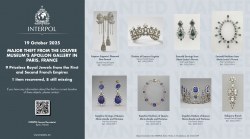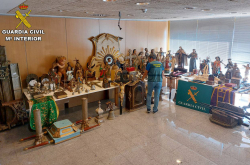United Nations recognition
At INTERPOL, we encourage not only police, but also government agencies, art and antiques dealers and owners of works of art to actively exchange information.
The efficient exchange of information via INTERPOL is central to these efforts, as recognized by United Nations Security Council (UNSC) and General Assembly (UNGA) Resolutions.
UNSC 2199 (February 2015) calls for countries to take appropriate steps to prevent the trade in stolen Iraqi and Syrian cultural property. It recognized the global role of INTERPOL in addressing this illicit trade.
UNSC 2347 (March 2017) is the first Resolution to focus solely on the protection of cultural heritage. It reaffirms the necessity to stop the illicit traffic of cultural property, underlining the link between these crimes and the financing of terrorism activities. The Resolution encourages member countries “to use and contribute to the INTERPOL’s Stolen Works of Art database” and stresses the role of INTERPOL to help prevent and counter trafficking of cultural property illegally appropriated and exported in the context of armed conflicts.
UNGA 73/130 (December 2018) marks an important milestone as it constitutes the first mention in a UNGA Resolution of the need for specialized police units to handle cultural heritage cases since the 1970 UNESCO Convention on the matter. The Resolution encourages all Member States to establish, with the assistance of INTERPOL, specialized police units exclusively dedicated to the protection of cultural heritage, while also stressing once again the importance of connecting national stolen works of art databases with INTERPOL databases.

Key partners
The need for concerted international action means we work in close partnership with other international organizations, including:
- Europol
- International Centre for the Study of the Preservation and Restoration of Cultural Property (ICCROM)
- International Council of Museums (ICOM)
- International Institute for the Unification of Private Law (UNIDROIT)
- Organization for Security and Co-operation in Europe (OSCE)
- United Nations Educational, Scientific and Cultural Organization (UNESCO)
- United Nations Office for Drugs and Crime (UNODC)
- World Customs Organization (WCO)





